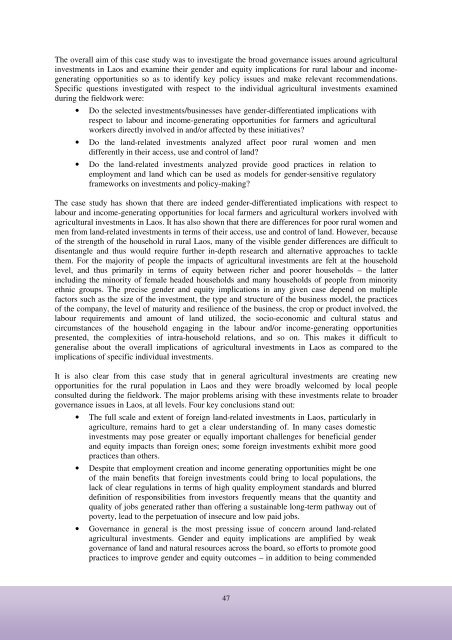6gEvuX
6gEvuX
6gEvuX
Create successful ePaper yourself
Turn your PDF publications into a flip-book with our unique Google optimized e-Paper software.
The overall aim of this case study was to investigate the broad governance issues around agriculturalinvestments in Laos and examine their gender and equity implications for rural labour and incomegeneratingopportunities so as to identify key policy issues and make relevant recommendations.Specific questions investigated with respect to the individual agricultural investments examinedduring the fieldwork were:• Do the selected investments/businesses have gender-differentiated implications withrespect to labour and income-generating opportunities for farmers and agriculturalworkers directly involved in and/or affected by these initiatives?• Do the land-related investments analyzed affect poor rural women and mendifferently in their access, use and control of land?• Do the land-related investments analyzed provide good practices in relation toemployment and land which can be used as models for gender-sensitive regulatoryframeworks on investments and policy-making?The case study has shown that there are indeed gender-differentiated implications with respect tolabour and income-generating opportunities for local farmers and agricultural workers involved withagricultural investments in Laos. It has also shown that there are differences for poor rural women andmen from land-related investments in terms of their access, use and control of land. However, becauseof the strength of the household in rural Laos, many of the visible gender differences are difficult todisentangle and thus would require further in-depth research and alternative approaches to tacklethem. For the majority of people the impacts of agricultural investments are felt at the householdlevel, and thus primarily in terms of equity between richer and poorer households – the latterincluding the minority of female headed households and many households of people from minorityethnic groups. The precise gender and equity implications in any given case depend on multiplefactors such as the size of the investment, the type and structure of the business model, the practicesof the company, the level of maturity and resilience of the business, the crop or product involved, thelabour requirements and amount of land utilized, the socio-economic and cultural status andcircumstances of the household engaging in the labour and/or income-generating opportunitiespresented, the complexities of intra-household relations, and so on. This makes it difficult togeneralise about the overall implications of agricultural investments in Laos as compared to theimplications of specific individual investments.It is also clear from this case study that in general agricultural investments are creating newopportunities for the rural population in Laos and they were broadly welcomed by local peopleconsulted during the fieldwork. The major problems arising with these investments relate to broadergovernance issues in Laos, at all levels. Four key conclusions stand out:• The full scale and extent of foreign land-related investments in Laos, particularly inagriculture, remains hard to get a clear understanding of. In many cases domesticinvestments may pose greater or equally important challenges for beneficial genderand equity impacts than foreign ones; some foreign investments exhibit more goodpractices than others.• Despite that employment creation and income generating opportunities might be oneof the main benefits that foreign investments could bring to local populations, thelack of clear regulations in terms of high quality employment standards and blurreddefinition of responsibilities from investors frequently means that the quantity andquality of jobs generated rather than offering a sustainable long-term pathway out ofpoverty, lead to the perpetuation of insecure and low paid jobs.• Governance in general is the most pressing issue of concern around land-relatedagricultural investments. Gender and equity implications are amplified by weakgovernance of land and natural resources across the board, so efforts to promote goodpractices to improve gender and equity outcomes – in addition to being commended47


